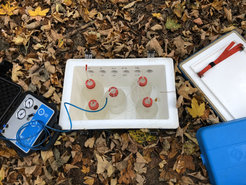
Molecular Biogeochemistry
The research group investigates key processes in global biogeochemical cycles at the molecular level. Biomarkers and their isotopic content provide information on the regulation of individual processes. The group develops new tools and applies existing techniques to study individual key processes.
Biomarkers are molecules that contain information on the presence of individual organisms in the environment. They span a variety of molecules with different chemical characteristics and are read using the “omic” approaches. DNA and RNA, for example, contain the genetic information of present and active organisms. This genomic information can be read and individual organisms can be identified. Both molecules, however, are very easily decomposed in the environment and consequently provide only snapshots of actual communities.
In contrast, lipids are compounds used to make cell membranes and cuticular waxes that can persist for a long time in the environment, and can even be isolated from Archaean rocks. Lipidomics is used to develop profiles that can identify individuals or groups of organisms as well as lipid profiles characteristic for environmental conditions including salinity, anoxia, and desiccation.

The key questions in molecular biogeochemistry are: Who is there, what are they doing, and why? Proteomic and metabolomic approach bridges from the presence of organisms to their function in the environment. However, in order to explore the function of individual processes and how the microbial fluxes link to the overall functioning of ecosystems, additional information is drawn from the isotopic information of biomarkers. Compound specific isotopes (13C, 14C, 15N, 18O and 2H) of biomarkers trace the flow of matter through the element cycles.
The group of molecular biogeochemistry combines approaches using the natural abundance of stable isotopes, isotope labeling, and stable isotope probing (SIP) to quantify key processes in the environment.
Are you interested in working with us?
We are always looking for interested students who would like to do a master thesis (preferably in combination with a project module) with us.
